OSBCU News
OSBCU News
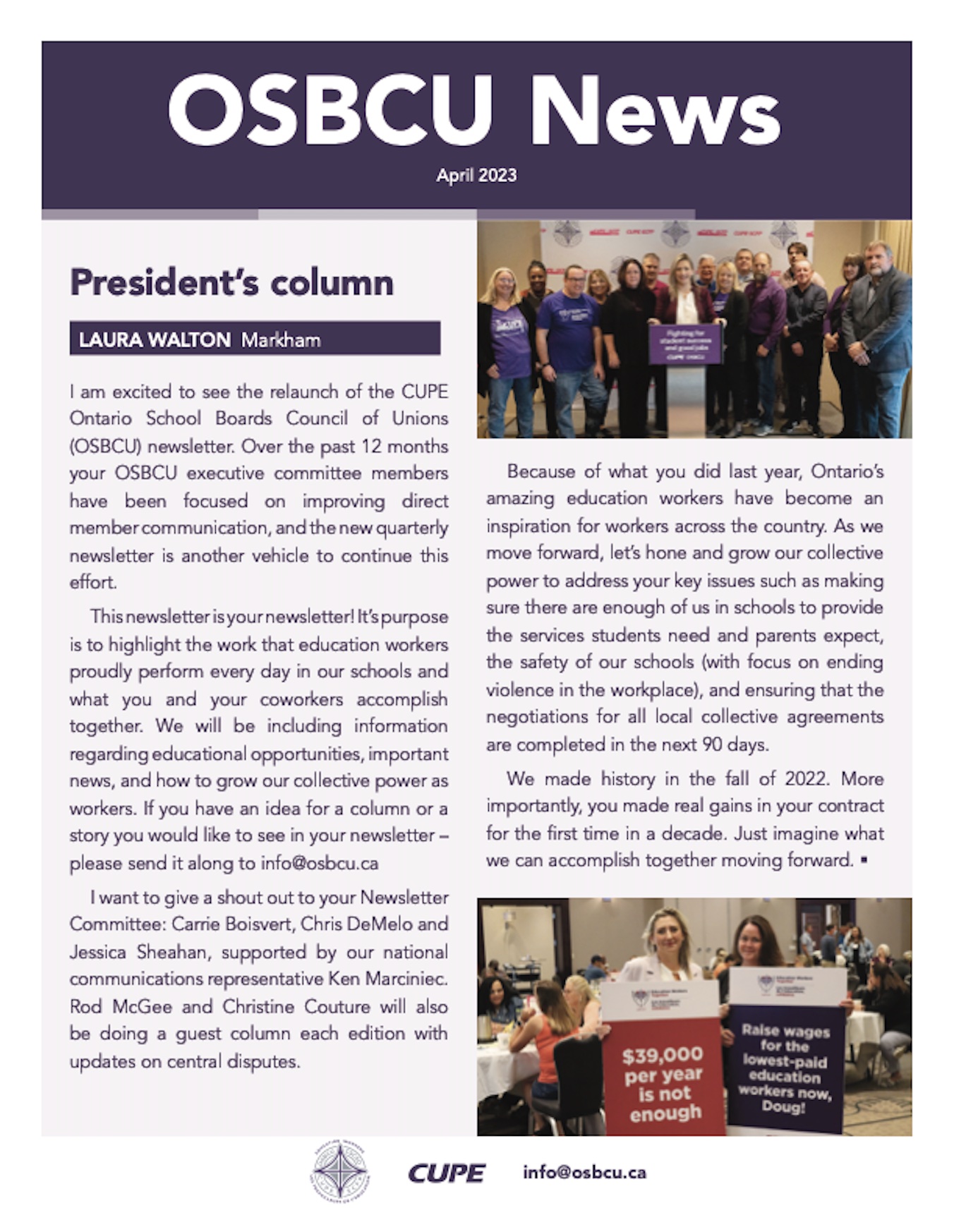
OSBCU News.
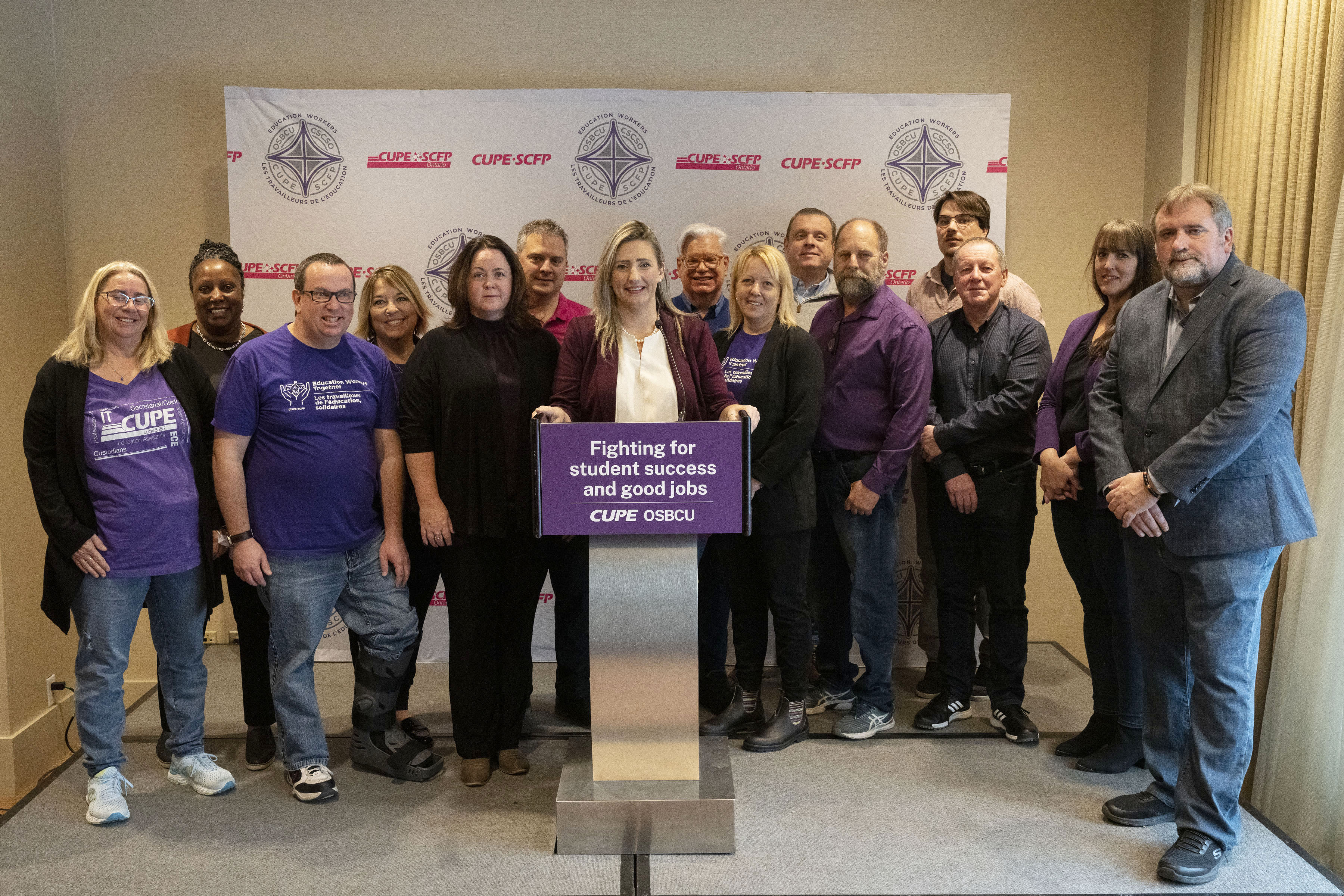
President’s column
Laura Walton Markham
I am excited to see the relaunch of the CUPE Ontario School Boards Council of Unions (OSBCU) newsletter. Over the past 12 months your OSBCU executive committee members have been focused on improving direct member communication, and the new quarterly newsletter is another vehicle to continue this effort.
This newsletter is your newsletter! It’s purpose is to highlight the work that education workers proudly perform every day in our schools and what you and your coworkers accomplish together. We will be including information regarding educational opportunities, important news, and how to grow our collective power as workers. If you have an idea for a column or a story you would like to see in your newsletter – please send it along to info@osbcu.ca
I want to give a shout out to your Newsletter Committee: Carrie Boisvert, Chris DeMelo and Jessica Sheahan, supported by our national communications representative Ken Marciniec. Rod McGee and Christine Couture will also be doing a guest column each edition with updates on central disputes.
Because of what you did last year, Ontario’s amazing education workers have become an inspiration for workers across the country. As we move forward, let’s hone and grow our collective power to address your key issues such as making sure there are enough of us in schools to provide the services students need and parents expect, the safety of our schools (with focus on ending violence in the workplace), and ensuring that the negotiations for all local collective agreements are completed in the next 90 days.
We made history in the fall of 2022. More importantly, you made real gains in your contract for the first time in a decade. Just imagine what we can accomplish together moving forward.
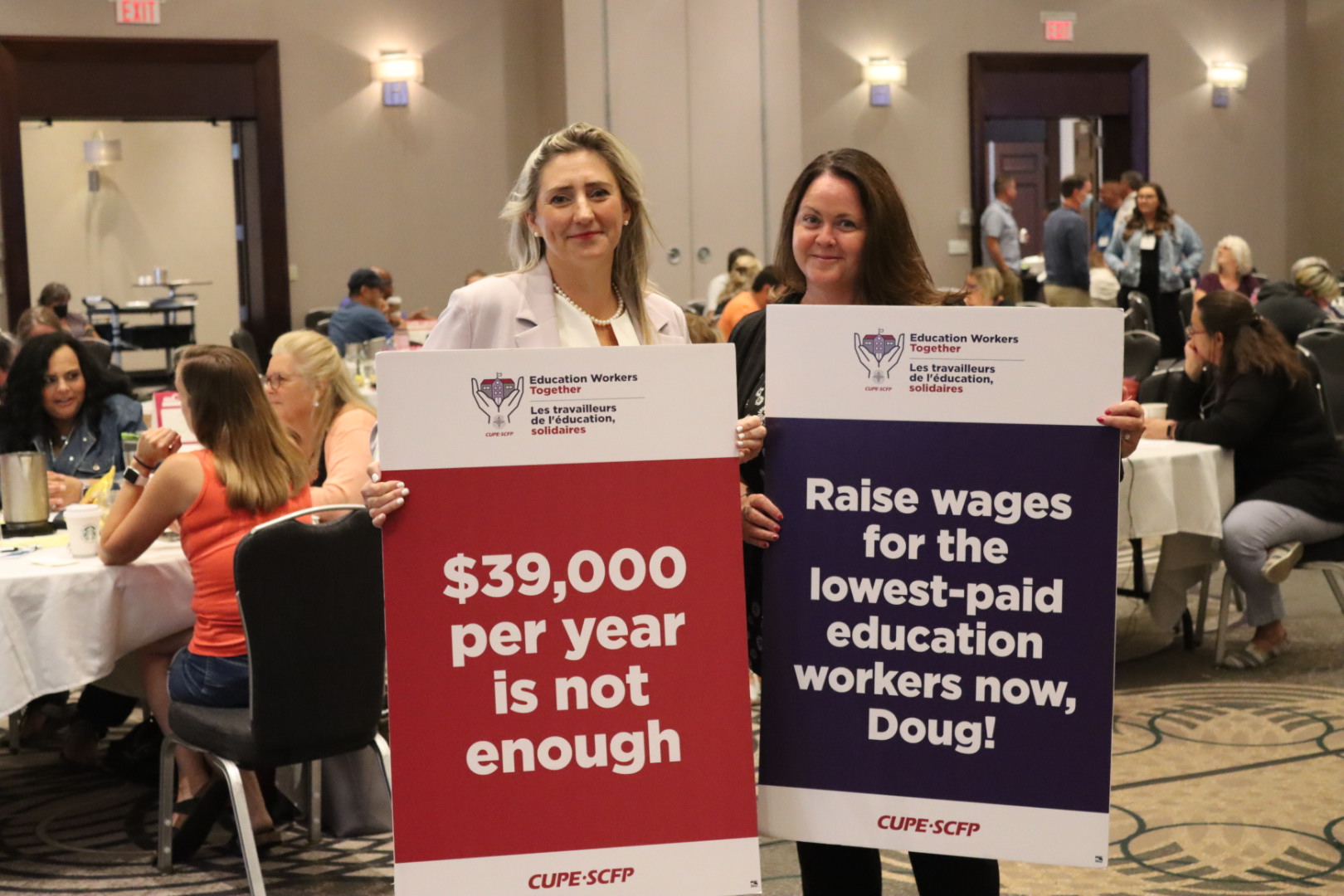
Gains Across Ontario: Workers winning beyond $1 more per hour.
The following are gains secured by OSBCU member- locals in this round of local bargaining.
CHRIS DEMELO Mississauga
CUPE Local 1358
Windsor Essex Catholic District School Board education workers bargained improved language in their local collective agreement by helping solve a problem for their employer at the same time.
“For more than 15 years, we’ve been trying to get language in our collective agreement that would recognize seniority for casual employees,” explains Darlene Sawchuk, president, of CUPE Local 1358.
“Two rounds of bargaining ago, we managed to get the board to create a hiring pool for the first time."
“This allowed those workers seeking permanent employment to interview and, if successful, be placed in the hiring pool in the order that management determined.”
“There was no language that stated seniority would have to be a factor.”
In 2022, our local bargaining team found something the board needed addressed and presented a solution that benefited workers for all future agreements and management right now.
“This round of bargaining we were able to point to supply staff shortages being at an all-time high,” Sawchuck said.

“We pointed out to the board’s negotiators that we had many supplies leave the board’s employ because they were able to secure permanent employment with benefits elsewhere.”
“They finally saw the light and now we have a hiring pool, with 20 people in it already, who are listed according to their seniority with the board.”
“Then, when our employer needs to hire someone into a permanent job, they’ll chose qualified workers from the pool starting with those who have the most experience.”
Old Collective Agreement Language
12:04 Temporary employees who have been interviewed and recommended for permanent positions shall be placed in an approved pool. Seniority in the Pool shall be based on the date the temporary employee is offered placement in the Pool. Selection of temporary employees for placement in the Pool, and timing/order of offers of placement, shall be at the discretion of the Employer.
New Collective Agreement Language
12:04 Temporary employees who have been interviewed and recommended for permanent positions shall be placed in an approved pool. Seniority in the Pool shall be based on the date the accumulated temporary seniority employee is offered placement in the Pool. Selection of temporary employees for placement in the Pool, and timing/order of offers of placement, shall be at the discretion of the Employer.
Additionally, the education workers on Local 1358’s bargaining committee got improvements for their coworkers who sometimes work outside of their own classification.
Educational Assistants working temporarily as Child and Youth Workers (CYWs) were not moving up the CYW pay grid with their years of experience.
Now any worker who temporarily steps up to do the work of another classification will be duly compensated for their years of experience.
New Collective Agreement Language
Permanent employees in temporary assignments shall be compensated for each full year of experience in their temporary role in accordance with the grid set out in Schedule A to the current collective agreement for that position.
CUPE Local 5335
Another remarkable win was achieved by Conseil des écoles publiques de l’Est de l’Ontario workers in Ottawa.
CUPE Local 5335 president Christine Couture, who also represents French-speaking education workers across the province as the CUPE Ontario School Boards Council of Unions (OSBCU) Francophone vice-president, explains that this bargaining committee got the employer to agree on a single process for positions that are filled by temporary staff.
Originally there were two staffing processes that would cause havoc with workers not getting access to fill in temporary positions.
“Now, more frontline education workers will have immediate access to benefits – like long-term disability insurance, the OMERS defined benefit pension plan – as well as all the paid leaves that permanent members are entitled to have under our collective agreement.”
New Collective Agreement Language
Members who perform work as unskilled in the position they hold, will, after 2 years (term po- sition) in a position of the same category, have the opportunity to apply for permanency in that job category. If the board accepts their request, the board shall allow 5 years to demonstrate that they are enrolled in training for the degree requested by the board. In addition, we have an article in our collective agreement that says that members can apply for annual financial assis- tance for professional development with the board for up to $500 per year.
This means members who have previously not had access to permanent jobs with the board due to lack of qualifications, will now be able to apply for a permanent job, apply for financial aid for education, and have access to all social benefits.
Education workers will also now be able to apply for recognition of their years of service with the board and be placed on the salary scale based on their work experience.
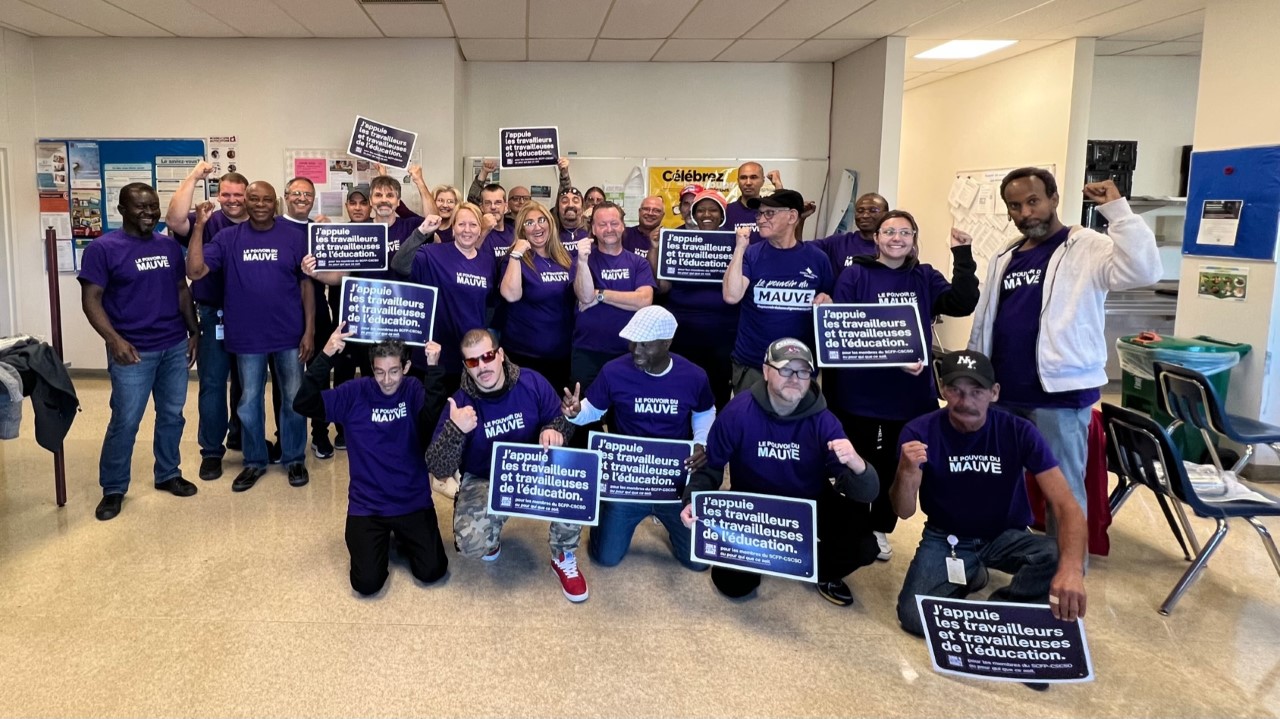
CUPE Local 4148
In Sault Ste. Marie, CUPE Local 4148 proudly reported that frontline education workers employed by Huron-Superior Catholic District School Board got the unnecessary distance restriction removed from their collective agreement’s bereavement leave provisions.
Prior to their recently-ratified new contract, workers would generally be allowed three days off days for bereavement leave, but five days if the deceased was over 160 km away from the employee.
Local President Crystal Krauter said this school board’s negotiators initially balked at the workers’ bargaining proposal to standardize five days of bereavement leave for any employee regardless of geography. Management claimed this was an issue that would have to be negotiated centrally.
“We held our ground, disputing this because our school board gets the same funding no matter the distance between the worker and where their loved one has died,” Krauter observed.
“But this wasn’t given freely,” noted Krauter. Their school board managers pushed back and cancelled bargaining dates in an attempt to squeeze the workers.
Ultimately the members of Local 4148 persevered and secured several really solid gains.
In addition to the common sense change to make bereavement leave better, there is now improved language on health and safety, who jobs are posted, and pay for Early Childhood Educators’ training.
Workers pigeonholed as “casual” saw organizing for power collectively result in a tangible gain for them too.
“This time real worker power was felt at the bargaining table,” Krauter said, with the outcome being casual workers’ credit for the time they’ve worked as of the end of June is now going to be carried forward to the next school year. Krauter shared that getting penalized under the old rules even happened to her.
“I’ve been working for this school board for more than two decades and, back when I was trying to get permanent employment, at the end of one school year I was only four days short from reaching the required 80 days,” she recalled.
“The old contract language being in effect then, I lost my position, had to revert to being casual the following year, and was left to apply like anyone new who was starting from scratch,” said Krauter.
“This win is a bid deal for casuals because managers so often treat them as second class workers,” Krauter concluded.
Classification Meetings
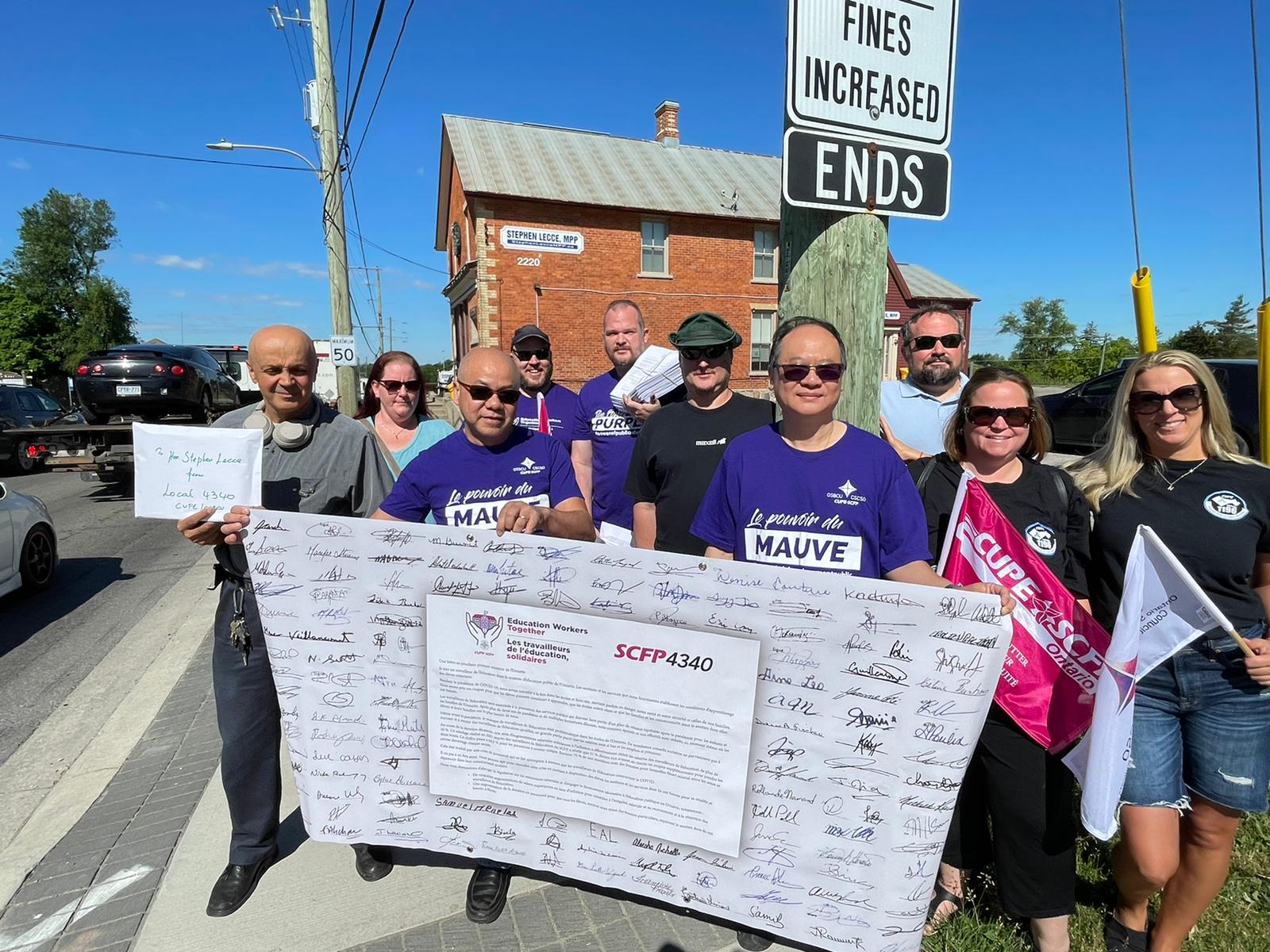
CARRIE BOISVERT Whitby
In February, seven classification meetings were organized for CUPE-OSBCU members to connect with your coworkers throughout the province.
This included the very first forum for lunchroom supervisors in addition to forums for clerical workers, custodians and caretakers, early childhood educators, educational assistants and child and youth workers, library workers, maintenance and trades people, professionals, and lunchroom/ student supervisors.
To ensure food services workers, information technology workers, instructors, and transportation workers have a voice, please be sure to register for your forums when they’re announced.
The dates and signup links for the next round of classification meeting will be published later this spring on the OSBCU website and social media.
From the Disputes Desk
ROD MCGEE Thunder Bay
CHRISTINE COUTURE Kingston
For 2022, the total number of disputes filed was 16. Of those, six were LOU #3 disputes (Protected Compliment), four were about C6 (Sick Leave) – ranging from refresh of days, to top-up and medical forms – there disputes had to do with the 1% pay increase, two were for casual lists, and there was one dispute regarding benefits.
This year has been off to a busy start with 30 disputes filed as of March 20. Most of these are on FTE (Full-Time Equivalent) or C6 matters.
The majority of disputes, except this year’s new ones, have been either resolved or withdrawn. Three disputes are in abeyance pending the outcome of future arbitrations.
Thanks to all the workers who have done their local’s work of reaching agreements with their employers to formally document the FTE numbers as of the date of ratification of the central collective agreement.
There are currently just 12 locals that have Support for Students Fund FTE agreements outstanding and nine central disputes have been filed about FTE numbers.
Establishing your board’s FTE number as of December 19, 2022 is the first step in being able to track and react to job cuts.
2023 Convention

LAURA WALTON Markham
Your CUPE Ontario School Boards Council of Unions (OSBCU) annual convention was held in Toronto during the last week of March.
Over 40% of the delegates from your 67 locals across the province were new, first-time attendees!
Workers organized themselves to be able to participate in their convention. They brought with them new energy, new ideas and fresh commitment to continue the work of the OSBCU going forward.
The convention opened on March 27 with a moving speech by Official Opposition Ontario New Democratic Party (NDP) leader Marit Stiles. Official Opposition NDP education critic and former CUPE researcher Chandra Pasma spoke on March 29, thanking you and your coworkers for fighting to protect the right of every Ontario child to access high-quality, education and for pushing the provincial government to ensure students get the supports they need in public schools.
Convention delegates participated in union education sessions including Conflict Ready Executives, Understanding Mental Health ,and Health & Safety: Committees and Recommendations. They also experienced our first OSBCU Information Carousel with short information sessions on a variety of topics including: Diversity in Our Locals, Working with Trustees, Maintaining Membership Lists, and Solidarity is Dead: Working with District & Labour Councils.
We also adopted our first Action Plan – we know firsthand that developing and “working the plan” leads to success.
There were some amazing panel discussions throughout your convention too.
On Tuesday, March 28, panelists Kaden Johnson, Shameela Shakeel, and James Clark reflected on People Power – how you fought the anti-worker Ford government and won with huge majority support from the people in communities throughout Ontario last fall.
The panel called Workers United, featured Ontario Public Service Employees Union (OPSEU) president JP Hornick, Amalgamated Transit Union (ATU) president John DeNino, and Roxanne Dubois, executive assistant to Unifor president Lana Payne discussing what you and your coworkers won and strength that came from education workers in three different unions – and the whole labour movement – uniting.
It was a week jammed packed with learning, business and a bit of fun with our beach party on Thursday night.
Understanding YourCollective Agreement
Spotlight on Sick Leave & Maternity Leave
JESSICA SHEAHAN Ottawa
Pregnancy & Parental Leave
Permanent employees (full- or part-time) taking pregnancy leave under the Ontario Employment Standards Act, 2000 are eligible for a top-up to Employment Insurance (EI) maternity benefits, or to payments in the event they are not eligible for EI benefits.
In some local collective agreements, those taking parental leave may also be eligible for a top-up. Consult your local collective agreement terms to see exactly how top-ups work in your bargaining unit.
You can access up to six weeks of sick leave at 100% to bridge you to an EI claim if you lack enough qualifying hours. (This is not deducted from your sick leave.)
Sick Leave
Your sick leave provisions are made up of:
- Sick Leave - 11 days at 100% pay
- Short-Term Disability Leave - 120 days at 90% pay
Sick leave and short-term disability leave days are replenished at the start of each school year.
Also, an employee who is hired partway through the school year is immediately eligible for sick leave.
There are special provisions dealing with how sick leave is refreshed for any employee who is off at the end of one school year and whose absence continues into the next school year. Consult your CUPE local representatives for advice if you are in that situation.

What if I’m not permanent? Do I get sick leave?
You might. In addition to permanent employees, employees in long-term supply assignments are eligible for sick leave.
A long-term assignment is either:
- as defined in your local collective agreement; or
- if there is no definition – 12 days of continuous employment in one assignment.
Did you know that you can top up your short- term disability leave (days at 90%)?
You can use any unused sick leave days from the previous school year to top up short-term disability days. (One unused sick leave day tops up 10 short- term disability days.)
For example, if in the 2021-22 school year you used zero of the 11 100%-paid sick days, in 2022-23 you can use those 11 days to top up the 120 90%- paid days to 100% pay. In this case, each of these 11 100%-paid days is worth the amount you’d need to top up 10 short-term disability days.
Questions?
Talk to your CUPE steward or your local executive committee members.

OMERS Pension Plan Change
MIKE GALIPEAY Sault Ste Marie
There has been an important change to the OMERS pension plan for all non-full-time employees.
Effective January 1, 2023, all employees of any OMERS member employer are eligible to join the OMERS pension plan regardless of their position or weekly hours of work.
There were two options for your school board:
- employers could send the OMERS enrollment package directly to their non-full-time employes directly; or
- starting January 2023, they could have OMERS make the offer to their non-full-time employees on their behalf.
With either option, your employer must provide OMERS with detailed information about their non-full-time employees within 30 days after each worker is hired.
If you are a non-full-time employee of a school board, you should have received your enrolment package by now.
If you still have not received your OMERS enrolment package from either your board or OMERS, please contact your CUPE local steward.
In the enrolment package there will be a Form 104, (offer of OMERS membership).
You have the option to enroll in and contribute to the OMERS primary pension plan.
Use the form to confirm your decision to join the OMERS plan or not. Then return the completed form as soon as possible to your employer.
A non-full-time employee who elects to enrol in the pension plan begins to participate in the plan as of their employer’s next available pay period following receipt of the election form, and no later than the end of the month following the month in which the completed form is received.
Download Newsletter: OSBCU News
